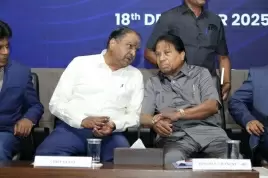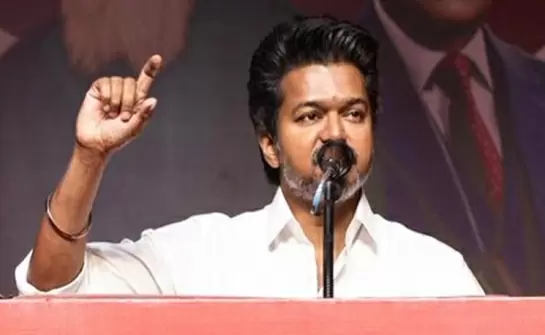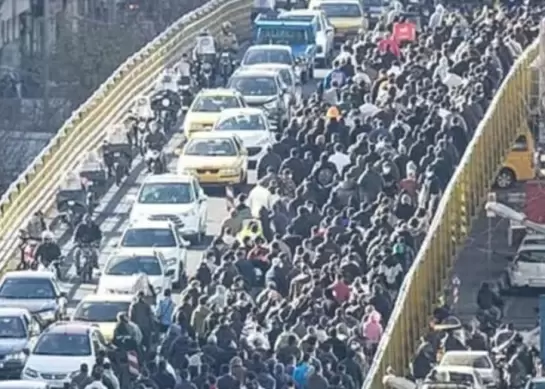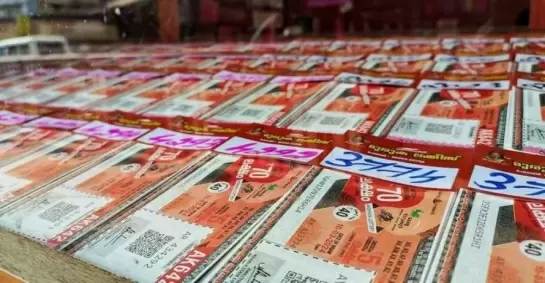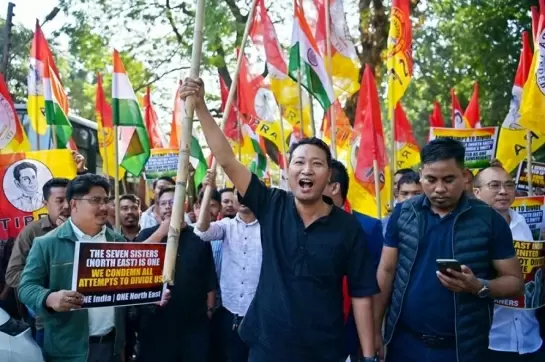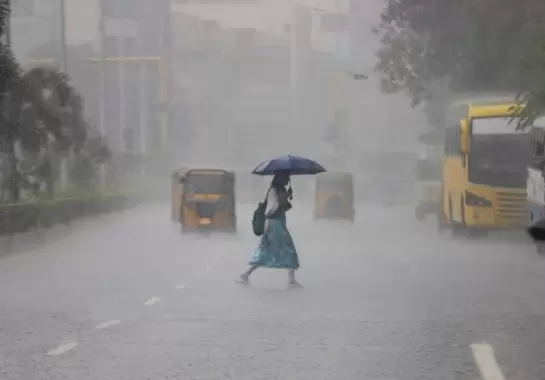In the UNHRC voting at Geneva, it was a win for Sri Lanka

05-April-2013
Vol 4 | Issue 14
The 21 March UN Human Rights Council vote was a victory for Sri Lanka since the US sponsored, India supported resolution did not call the human rights violation as State sponsored.
Last year’s resolution as well as this year’s resolution calls for implementation of the recommendations of the Lessons Learnt and Reconciliation Commission.
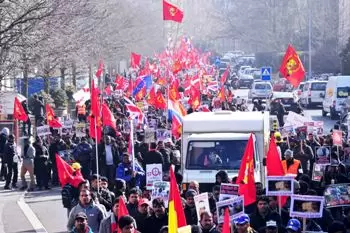 |
|
The UNRC resolution disappointed the global Tamils who rallied for an independent investigation into Sri Lankan war crimes
|
Eelam Tamils consider it a mockery of justice as President Mahinda Rajapaksa is both the culprit and the judge. The LLRC report provides a dangerous blueprint for structural and cultural genocide of Sri Lankan Tamils.
It categorically denies the existence of a historical Tamil homeland comprising the Northern and the Eastern Provinces and insists that by 2020 no district or Province in the island nation can be categorised on the basis of language.
The UNHRC meeting in Geneva gave an opportunity to policy-makers in New Delhi to promote sustainable peace and political settlement of the Tamil problem in Sri Lanka.
Instead, India engaged in behind-the-scenes diplomacy to tone down the US-sponsored resolution to make it almost meaningless for the Tamils and voted for it, incurring the displeasure of Rajapaksa.
There is no mention of “an independent and credible international investigation” as mandated by the report of the UN High Commissioner for Human Rights.
Expression of concern over the failure of devolution of powers is missing in the final draft of the resolution. The word genocide is conspicuous by its absence.
According to the UN, “Any of the following acts committed with intent to destroy, in whole or in part, a national, ethnical, racial, or religious group as such: killing members of the group; causing serious bodily or mental harm to members of the group; deliberately inflicting on the group conditions of life calculated to bring about its physical destruction in whole or in part; deliberately inflicting on the group conditions of life calculated to bring about its physical destruction in whole or in part; imposing measures intended to prevent births within the group; and forcibly transferring children of the group to another group,” constitute genocide.
Why is India reluctant to call the Sri Lankan pogrom genocidal?
Pakistan, on the other hand, went all out mobilising the Islamic member-nations to oppose the resolution.
Hina Rabbani Khar, Pakistan foreign minister, directed Zamir Akram, her country’s ambassador to the UN in Geneva, to arrange for meetings of diplomats from the Organisation for Islamic Cooperation and likeminded groups and lobby for Sri Lanka.
Except for Libya and Sierra Leone, all OIC members voted against the resolution, taking the tally of negative votes to a respectable 13 with nine abstentions.
Their support for Sri Lanka was despite lobbying by the US diplomats on issues Muslims in the island nation were facing from the Bodhu Bala Sena (BBS) and inclusion of a line to the resolution expressing concern on “discrimination on the basis of religion or belief.”
BBS has been spreading anti-Muslim rhetoric and recently forced the abolishment of Halal certification. Now they want to change how Muslim women in Sri Lanka dress.
Only 25 nations, including India, voted for the resolution in the Human Rights Council made up of 47 nations with voting rights.
Pakistan’s foreign secretary Jalil Abbas is visiting Colombo on 4 April to carry forward the relationship between the two countries. He will call on, among others, President Rajapaksa while in Colombo.
Sri Lanka will no doubt appreciate Pakistan’s newfound friendship and China’s steadfast support and the two countries will move closer to Colombo and fill the vacuum left behind by India.
China has just completed Sri Lanka’s second international airport at Mattala, funded by China’s Export-Import Bank. It can accommodate Airbus A380, the biggest airliner in service, and is surrounded by a free trade zone.
When India voted against Sri Lanka at last year’s Human Rights Council meeting in Geneva, Prime Minister Manmohan Singh bent over backwards to please Rajapaksa by saying, “Your Excellency would be aware that we spared no effort and were successful in introducing an element of balance (euphemism for watering down) in the language of the resolution.”
External affairs minister Salman Kurshid suggested this time, as if to atone for past sins, that the US and Sri Lanka should directly engage on the draft resolution and “aim for a mutually acceptable outcome.”
The resolution put to vote suggests that the dialogue between the two has been fruitful and a deal has been struck.
India is unwilling to accept that the Northern and the Eastern Provinces of Sri Lanka is the traditional homeland of Tamils notwithstanding the Indo-Sri Lanka Agreement of 1987 Rajiv Gandhi entered into with JR Jayawardene and committed Indian Peace Keeping Force to implement it in which more 1,300 of our soldiers were killed and thousands maimed for life.
The UPA government lacks the political will or conviction to find a solution to the ethnic crisis or seek justice for the aggrieved. Carrying the diktats of the Geneva resolution will only annihilate the genuine aspirations and right to self-determination of the Tamils in the island nation.
The agenda of the Rajapaksa regime is to buy time to complete Sinhalisation of the Northern and the Eastern Provinces and destroy the existence of the Tamil people in the island nation.
Every State has a responsibility to protect its citizen from mass atrocities like genocide, ethnic cleansing, war crimes and crimes against humanity, and the international community has a responsibility to assist and build capacity of those States that are unable to protect.
The R2P doctrine has grown from the troubled conscience of the international community after the Rwandan genocide and the Srebrenica massacre in the 1990s. World leaders agreed to the principle of R2P in the World Summit Outcome Document in 2005.
The R2P doctrine suffered a huge blow in May 2009 when the international community watched over grave abuses being inflicted on the Tamil people in Sri Lanka.
The default response of the international community can be coercive military measures if genuine efforts at pacific settlement have failed. The doctrine will become a dead letter in international law unless used in appropriate cases in a timely manner in the interest of oppressed people.
The 2012 Geneva resolution gave the government of Sri Lanka time to pursue its agenda of Sinhalisation of the North-East. This year’s resolution, again insisting on a local process, will give further time to complete agenda.
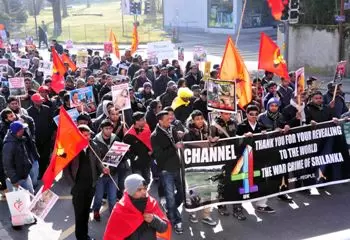 |
|
Tamils protesting in Geneva during the UNHRC session demanding action against the genocidal Sri Lankan regime
|
If the intention of the international community is to alleviate the post-war sufferings of the Tamil people, it is time for the UNHRC to invoke the R2P doctrine and call for a transitional interim administration for the Northern and the Eastern Provinces, as the government of Sri Lanka has failed to protect a section of its citizens.
Such an idea has been explored before during the 2002-2005 peace process and in the post-Tsunami context.
If anybody thought Sri Lanka would mend its ways after the Human Rights Council resolution, they are mistaken. Even as the 22nd session of the Council was discussing the resolution, people in the Tamil district of Mullaitivu were asked to hand over private lands to make way for a new army camp.
It shows the scant regard of the authorities to the reconciliation process. With the impeachment of Chief Justice Shirani Bandarayake and the appointment of Mohan Pieris, as CJ, a vigorous defender of the government’s conduct of the war, the prospects of accountability through a local process have become nil.
Had Shirani continued as Chief Justice, it would not have been easy for the Rajapaksa regime to usurp powers of the Provinces, particularly the Tamil majority North and East.
The UN Secretary-General’s Panel of Experts report contains the best of recommendations on accountability and way forward in Sri Lanka. It should be heeded by the international community concerned about the plight of Eelam Tamils.
Sam Rajappa is Consulting Editor of The Weekend Leader







